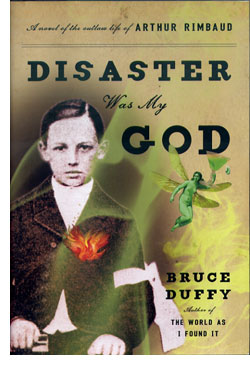 |
 |
 Bruce Duffy
Bruce Duffy
Disaster Was My God: A Novel of the Outlaw Life of Arthur Rimbaud
Reviewed by: Rick Kleffel © 2011
Doubleday / Random House
US Hardcover First Edition
ISBN 978-0-385-53436-9
Publication Date: 07-19-2011
364 Pages ; $27.95
Date Reviewed: 07-29-2011
Index:
General Fiction
Non Fiction
If it weren't based in fact, it probably would not fly as fiction. In 19th century Paris, a 14-year old poetic prodigy shows up and changes the face of literature. He is beyond brilliant, and he seems to think himself beyond all convention. He moves in with a famous poet and his wife, then proceeds to have an affair with the poet, who shoots himself when the boy genius threatens to leave. And this is just the first act of Arthur Rimbaud's Life.
Rimbaud is a legend and an inspiration to writers, poets and artists of all stripes to this day. And it is not just the art he created, the poetry that plagues tortured souls. Rimbaud's words are practically the Platonic incarnation of that inner torment. It is his life that pulls to us, that speaks to our desire live beyond compromise.
Not surprisingly, Rimbaud has been written about often, but not until now by Bruce Duffy in 'Disaster Was My God.' Back in 1987, Duffy sent the world biographical fiction reeling with the story of Ludwig Wittgenstein in 'The World As I Found It,' recently added to The New York Review of Books Classics series. Duffy manages the difficult feat of bringing a larger-than-life figure to life, with nothing more — or less — than language.
It's not an easy task and Duffy does not take the easy path. 'Disaster was My God' is an audaciously constructed, powerfully composed work that manages to create for the reader not simply the facts of Rimbaud's life, but rather, the driving, almost insensate force that made those fact so alarming, so alluring. Duffy finds fire with fire.
Rimbaud lived a famously short life, and the plot structure of Duffy's novel manages to capture the brevity while preserving the power. We meet the boy-genius, the holy terror in Paris as he arrives to wreck both lives and literature, to change both forever while seeming not to give a fig about either.
In alternating sections, we are with a man who should still be young, who physically is still young. But he is now a haunted soul, a man who has moved so fast he has left life behind. He is the walking dead, an incarnation of the tortured souls he wrote about in his incandescent youth. Duffy's careful edits propel the reader through a life that had to by definition be cut short. Arthur Rimbaud could never have lived longer. It's possible that Duffy gives us more than we need with regards to plot, but if we must overdose, then Rimbaud is at least a potent and pretty drug with which to do so.
But Duffy's smart plotting is buttressed by prose that is alternately spare and lush, see-sawing in and out of hallucinatory grace. There are times when the swings seem too intense, and times when the cuts are too sharp, but Rimbaud was not an easy man. He is not an easy creature to capture and Duffy's prose has a rough feel about it that feels like raw footage.
'Disaster Was My God' may begin with a burial, but it raises the dead, or rather brings to life those who never really died. Nobody alive today could ever have looked Arthur Rimbaud in the eye. None of use could know his soul. We can only read his work and read about him. We need and want more than the man himself could give us. Bruce Duffy manages to create fiction that we believe in our hearts from facts that our minds would deny.
|
 |
|
|
 |
| |
Review Archive
All Reviews alphabetized by author.
General Fiction
Non-Genre, general fiction and literature.
Horror
Supernatural fiction, supernatural horror and non-supernatural horror.
Science Fiction
Science fiction, science fantasy, speculative fiction, alternate history.
Fantasy
Fantasy, surrealism and magic realism.
Mystery
Crime, thrillers, mystery, suspense.
Non-Fiction
Non-Fiction, True Crime, Forteana, Reference.
Poetry
|
|
 |
|




